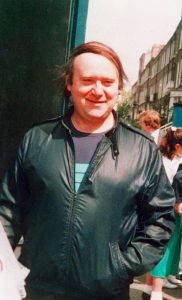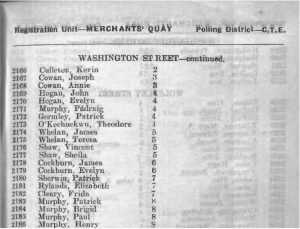After Independence, official Ireland understandably set about undoing the grievous distortions wrought on Gaelic surnames by English-speaking administrators. Every surname now had to have an official Irish-language school version, on the basis that we were all Gaels and had had our original names stolen from us.
For the purposes of officialdom, my father became Mac Grenacháin; when I went to school, I became O’Grianáin; my son was later dubbed Ó Gréacháin.
Never mind the tunnel view of history and the hair-raising presumption that Ireland was racially pure, the implicit understanding of surnames was simply nonsensical.
Because the most important fact about all surnames is that they are words. They don’t have DNA, go to any particular church, salute flags, vote or fight. They simply swim in the ever-changing sea of language, evolving as all languages do under the pressure of accents, education, fashion, politics, economics.

For example, the American pronunciation of the surnames Cahill (“KAY-hill”) and Mahony (Ma-OWN-ey) often has Irish people sniggering up their sleeves. But these pronunciations are much closer to the original Irish-language versions of the names (Ó CATHmhaoil, Mac MaTHÚNa). The fork in culture between Irish-America and Ireland preserved something over there that we over here have anglicised more thoroughly.
Whether American or British, the language Irish surnames have swum in for almost two centuries is English. Seen in this light, the 20th-century Gaelicisation of surnames, the great wave of adoptions of O’s and Mc’s, was not the reclamation of something lost but a further evolution, a flawed reinvention of an imagined past – ask Theodore O’Kechuckwu, living at 1 Washington Street in Dublin in 1949.

The evolution of surnames has not stopped, though it has slowed, not just in Ireland but throughout the developed world. Mass literacy and computer technology have make it more difficult for change to occur – simply seeing your name in print on a computer screen every day lends it apparent permanence.
Apparent only: I have no doubt that in a few centuries people will look back in amusement at our qnt srnm spllngs.
This makes me wonder if my relatives haven’t tried to start pronouncing our “Sughrue” surname in an “Irish” way instead of our our grandparents pronounced it, and ended up Anglicizing it? (I’m American.)
My mother always pronounced it “SHUH-groo” where the first syllable sounds like the first in “sugar”.
Some cousins went to Ireland and came back saying it “Shuh-GROO” ever since. Must have been corrected. But were they correctly corrected?
Wonder where the surname Heanue came from?
Apparently, it’s from Connemara according to John Grenham’s website: https://www.johngrenham.com/findasurname.php?surname=Heanue
Heanue rare: Conamara. Ir. Ó h-Eanadha (Ó h-Éanú). Thought to be variant of Ó h-Éanna and always associated with Conamara. SI & SGG.
MacLysaght gives: O Heanue/Heanue. Ó hÉanadha. This is seldom found outside Connemara where it is fairly numerous. It is probably an offshoot of the Mayo sept O Heaney, Heeney
Great post! I had noticed the general lack of “Mac” and “O” in church and civil records before ~~1880. Is there any good reference about when this happened, and why?
The gaelicisation which commenced in the 1880s, stemmed from the national anger consequent on the economic downturn which started 1877. Civil disorder and oppression reached the depths in 1882. This was the year that Burke and Cavendish were murdered and the National League was founded, followed in 1884 by the Gaelic Athletic Association, and subsequently by the Gaelic League.
For many people, adding an O’ or Mc was an easy way to express their new or resurrected Irish identity.
The late Arthur C Clarke created a character with the surname “Makenzie”, which had been “McKenzie” up to the point it was misspelled by an official keying in to a computer file. After 30 years of trying, the character’s grandfather gave up and accepted the inevitable and passed it on to his descendents.
I am a rather dumb American when it comes to my Irish surname. In looking at old records, I have seen it spelled a million different ways (well maybe not that many) even in the same family. I spell it Connelly my great great grand father who came to America in 1850 spelled his name Conelly, Conly, Coneoly, Connolly, Conley. Connely and other ways. I don’t know if this was his idea or just the way people wrote it down. On his will, he signed it Conely. I imagine the Irish spelling is Conghaile but I don’t know and does it even make a difference. When I went to Ireland 20 years ago some people called me con-kneel-lee and others called con-nelly. In America they say con-lay. I guess it doesn’t mean all that much in the end but it sure as heck makes me wonder.
I know that where I live in Ireland, the various spellings are pronounced differently. The surname Connolly is pronounced Con-lee, Connelly is pronounced Cuh-nell-ee, and Conneally pronounced Cuh-kneel-ee. I’m sure that they’re all the one surname really but I think that the different surnames and spellings are used to distinguish different families from each other. My grandmother was Conneally but in records going back there were a range of spellings and my 4x great grandmother was Mary Connella with some still spelling it as Connella while others took on the spelling Connelly.
My grandfather was born John Hamrogue in County Mayo in 1884 and immigrated to Ellis Island where his name became John Joseph Pemrick. His uncles had previously immigrated to the US and became the supposedly Anglicized version Pemrick. In my research there were other Hamrogues in Philadelphia and Bolton Lancashire England that changed it also to Pemrick. I have never understood how they got Pemrick out of Hamrogue. Hamrogue to me never sounded Irish at all and Pemrick sounds English. Have you ever come across the rather rare surname Hamrogue which I have seen spelled Hambrough, Amroge in Ireland. Thanks for any insights. Kevin
This is John’s account of the surname: https://www.johngrenham.com/findasurname.php?surname=Hamrogue
Hamrogue rare: Mayo. Ir. Hamróg. A case of an English toponymic, Hambroke, first gaelicised and then re-anglicised to Hamrogue. SI & SGG.
So you’re right that it never sounded Irish since the surname is derived from an English placename Hembroke. The map on the website only shows the surname in Mayo which is where your ancestors came from.
A friend in the US Army was named ODonnell. I, like many others, would point out to him that he needs an apostrophe in there somewhere. He would then tell the story of his Italian ancestor. His name was Doniello. He was in Philadelphia and wanted a job as a policeman. So, he changed hs name to ODonnell, not knowing there should be an apostrophe in there somewhere. And, that is how his grandson still spells the name…..
My father-in-law is named McTee. We have found that in the 1860s of Chicago they were McEntee and apparently abridged their surname.
My surname is COYNE .According to MacLysaght it is an original irish (ie gaelic) name with some variations in spelling and possibly in pronunciation eg Kyne. Seemingly COYNE comes from O’CADHAIN- barnacle goose-with variation COEN.Which leads me to my wife’s experience and alluded to by MacLysaght.She had no problems with entry into Israel where she was employed at a leading hospital. It seems that her surname was confused frequently with COHEN of the tribe of Levi! This eased her way into Israeli society.
Interesting question about the O and the Mc. Am researching the Creans and O’Creans. It appears so far that in France and Spain in exile, they retained the O. But, the cousins still in Ireland were simply “Crean” without the “O” at about the same time, the mid 1700’s.